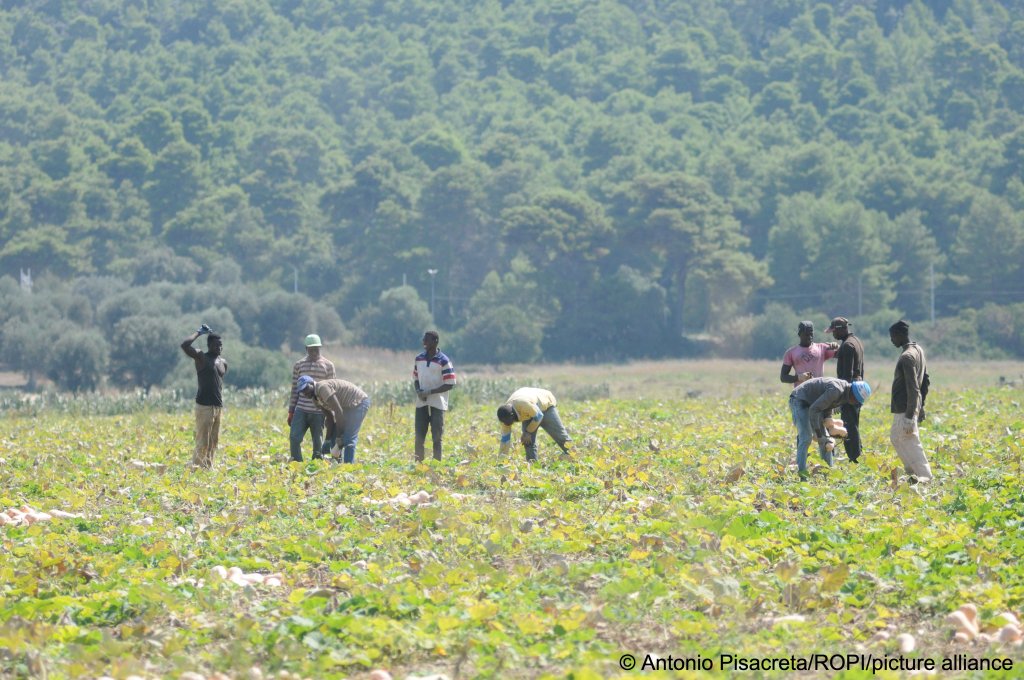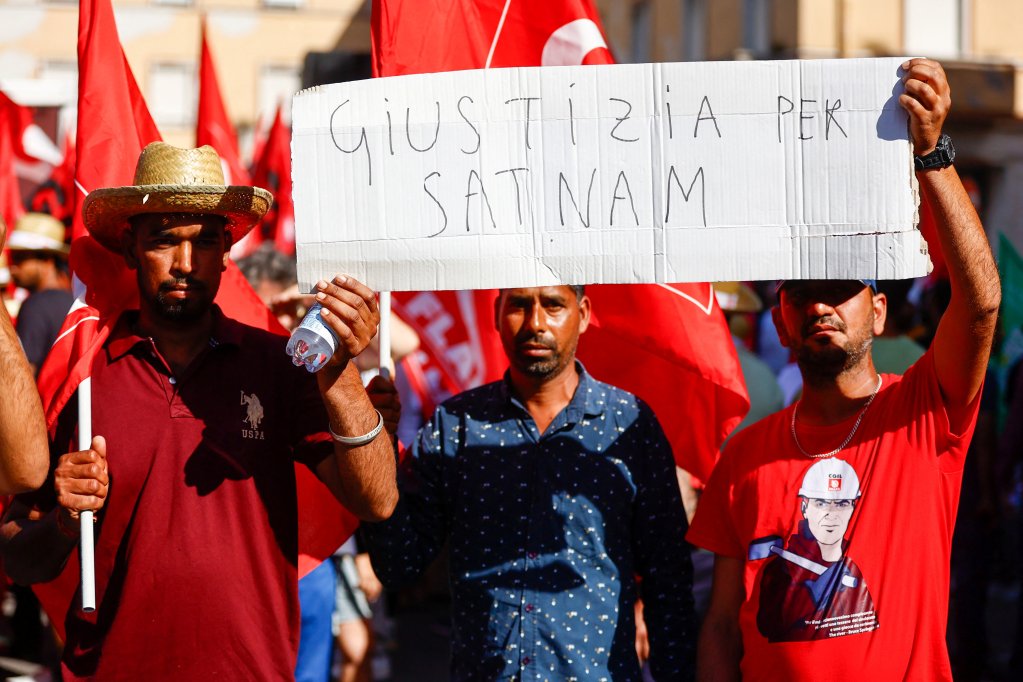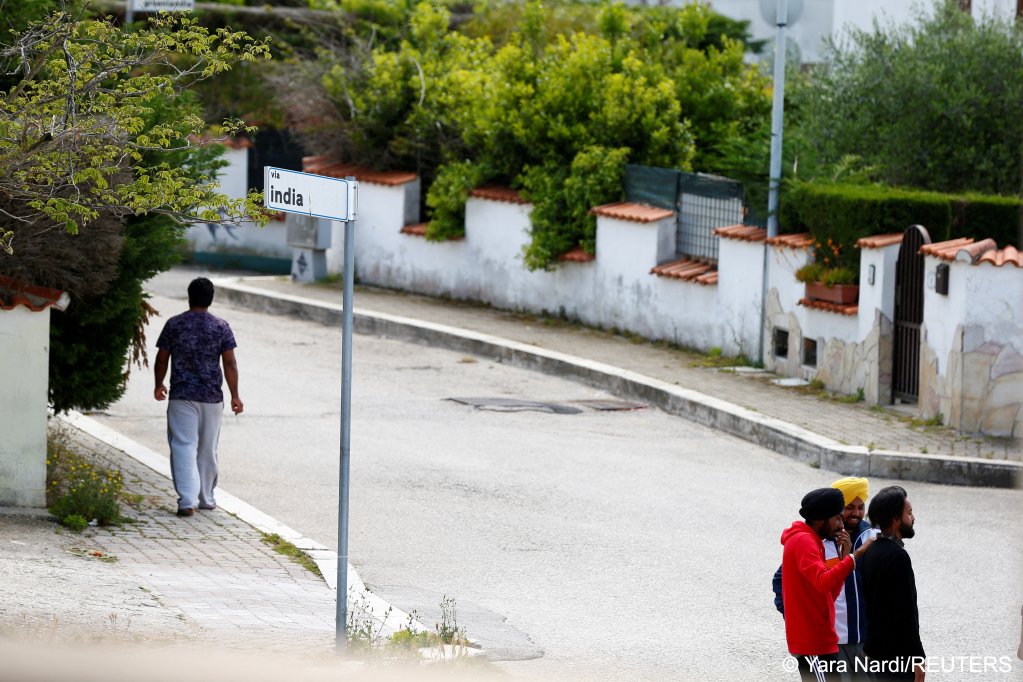The death of an Indian migrant worker in Italy, who was reportedly abandoned on a road after his arm was severed in a work-related incident, has shocked the country and prompted calls for better protection against migrant worker exploitation.
Following the death a 31-year-old farm worker, there have been calls from within the Italian government to take action against the exploitation of migrant workers in Italy.
Satnam Singh was left severely injured on the street last Monday (June 17) after losing his right arm while working at a farm near Latina, southeast of Rome, SkyTG24 reported.
Italian state broadcaster RAI reported that Singh's arm was severed by a plastic wrapping machine on the farm, which was being towed by a tractor, and crushed his lower limbs. He was later loaded into a van and abandoned near his home, his severed arm was found in a vegetable collection box, according to RAI.
The Guardian reported that his wife called the police and an air ambulance was sent to transport him to San Camillo Forlalini hospital in Rome. However, he died two days later, on Wednesday, as a result of his injuries, CNN reported.
His death has come to symbolize the exploitation of vulnerable migrant workers in the country. Several trade unions and Latina’s Indian community have been organizing demonstrations in the past week.
Prime Minister Giorgia Meloni expressed her condolences and strongly condemned Singh’s death at Thursday’s cabinet meeting.
"These are inhumane acts that do not belong to the Italian people, and I hope that this barbarism will be harshly punished," she said in a statement.
Also read: Exploited and abandoned, Indian farmworker dies in Rome
Investigation into the farm owner
The incident has led to an investigation into the farm's owner, Antonello Lovato, who allegedly left Singh outside his home after he sustained his serious injuries, over potential charges of manslaughter and failure to assist a person in danger, Reuters reported.
Lovato’s father, Renzo Lovato told RAI that Singh had been warned "not to approach the vehicle" and that "there is sadness because a man died at work and it should never happen."

The Lovato family’s lawyer, Valerio Righi, told Reuters that Antonello Lovato "spontaneously went to the judicial police an hour after the events, as any decent person would do," adding that his client was waiting for the charges to be formalized to defend himself.
In response to allegations that Singh was abandoned without calls to an ambulance, Righi stated, "You will see during the proceedings that maybe help was called sooner than people think."
Laura Hardeep Kaur, general secretary of the Frosinone-Latina unit the FLAI-CGIL labor union, told Il Giorno newspaper, claims that the employer ignored calls to get him medical assistance. "He was left on the road like a bag of rags, like a sack of rubbish … despite his wife begging [the employer] to take him to hospital."
She added that "we are not only faced with a serious workplace accident, which in itself is already alarming, we are faced with barbaric exploitation. Enough now."
Also read: Arrests made in Tuscany due to suspected exploitation of migrants
Fight against labor exploitation
Singh came to Italy with his wife three years ago and had been working at the same company in Italy for two years without a residence permit. According to Hardeep Kaur, Singh was working for 5 euros an hour without a legal employment contract. "Foreign laborers continue to be invisible, at the mercy of ferocious bosses, often Italian," she said.
Trade unions met with the Italian labor minister Marina Elvira Calderone and agriculture minister Francesco Lollobrigida on Friday to discuss changes needed to prevent such incidents from happening again.

On Friday, Lollobrigida stated that Singh's death was the "the fault of a criminal" and should not result in the criminalization of all agricultural enterprises, despite calls to eliminate labor exploitation.
Lollobrigida, who is also the brother-in-law of Meloni and a member of her far-right Brothers of Italy party insisted that "these deaths aren't the fault of agricultural entrepreneurs" but that of criminals.
However, the labor minister took a more critical approach. In an interview with RAI Calderone stated that Singh's death is “much more than an injury: it is an inhuman act of barbarism in which those who abandoned him demonstrated that they had no regard for the value of human life." She also called for exemplary punishments against exploitation at work.
Several trade unions organized a fundraiser to raise money for Singh’s family and a demonstration at the weekend in Latina and called for a two-hour strike to demand "dignity and respect for the health and safety of workers," urging action against worker exploitation and inhuman work conditions.
Also read: Unions want justice for worker who died on Paris Olympics construction site
'Modern slavery'
The farm worker’s death has sent shockwaves through Italy. Trade union leader Maria Grazia Gabrielli called the incident one of "unprecedented brutality", in a press release last week. She added that the incident was a result of "the irregularity in which we relegate thousands of migrants who arrive in our country in search of hope."
Gabrielli said migrants found themselves as "slaves of contemporary society, irregular, without a residence permit, and therefore more susceptible to blackmail by those who consider work only for profit, and rights — such as that of assistance — only as obstacles."
She added that exploitation in the fields often results in "starvation wages, unsafe and inhuman working rhythms and conditions, psychological and physical violence which unfortunately also lead to terrible events like the one in Latina."

A recent report commissioned by the FAI-CISL union revealed that immigrants were responsible for producing at least half of Italy's food products in 2022. This is despite official government data indicating that 362,000 immigrants worked in the food sector that year, accounting for only 31.7% of the total days worked.
The report emphasized the presence of numerous "invisible" workers who actively contribute to Italian food production. It stated that official agriculture ministry data is "distorted" due to the significant risk of labor exploitation in the sector.
Also read: Made in Italy: Immigrant labor behind half of all food products
Labor shortage
Italy, like many European countries, is currently facing a labor shortage. The Bank of Italy has stressed the need for more international workers to counteract demographic decline. The governor of the Bank of Italy, Fabio Panetta, noted that even with 170,000 people entering annually, Italy's working-age population will significantly decrease by 2040.
In 2022, the Confartigianato Association reported that Italian companies couldn't fill 45.1% of job vacancies, amounting to 2,484,690 unfilled positions, with small businesses and artisans particularly affected. The IDOS Study and Research Centre stated that Italy would need over 280,000 international workers annually until 2050 to address labor shortages due to an aging population.
To address these issues, Italy is participating in the European Commission's "Partnerships for Talent" program, aimed at attracting skilled labor from third countries like Bangladesh, Egypt, Morocco, Pakistan, and Tunisia. This initiative seeks to enhance regular mobility channels for work and improve migration management.
However, current Prime Minister Meloni has built her political career on hardline anti-migration policies, introducing laws that hinder sea rescue, criminalize NGOs and further externalize the European asylum system. Within Italy she has also faced increased criticism for undermining democracy by introducing constitutional changes and attacking press freedom.
While leaders like UK Prime Minister Rishi Sunak have sought guidance from Meloni on migration policy, her hardline policies could be harmful to the economy which relies heavily on migrant labor, while creating a legal vacuum that increases the likelihood of workplace exploitation.
Also read: Italy: Work visas being abused by organized crime, says PM
Europe's reliance on migrant farm workers
Earlier this month the University of Comillas and Oxfam researchers published a report on the exploitation of migrant farm workers in Europe. According to Oxfam, one in four workers in the European agricultural sector is a migrant. "Migrant workers face violence, long working hours and systematic underpayment," says the NGO. The European agricultural industry “exploits at least 2.4 million migrants who harvest fruit and vegetables in Europe."
Speaking about the report, Nerea Basterra, Oxfam Intermón Head of Private Sector stated that it seeks to expose "the underbelly of Europe’s agricultural industry, which has at its core exploitation and breaches of European law."
The report highlights that accidents and injuries are common due to the lack of adequate training and protective equipment provided by employers, particularly in Spain and Italy.
"European leaders can no longer ignore the exploitation lurking in the agricultural industry and sneaking into every European’s shopping trolley," said Basterra.
The EU recently approved new rules on supply chains for large companies, which seek to facilitate access to justice and compensation to survivors, as well as placing greater responsibility on agribusinesses and retailers to both prevent and take responsibility for human rights violations.
Basterra noted that there is hope in the new EU law on supply chains "it could end exploitation, if European countries use it right."
